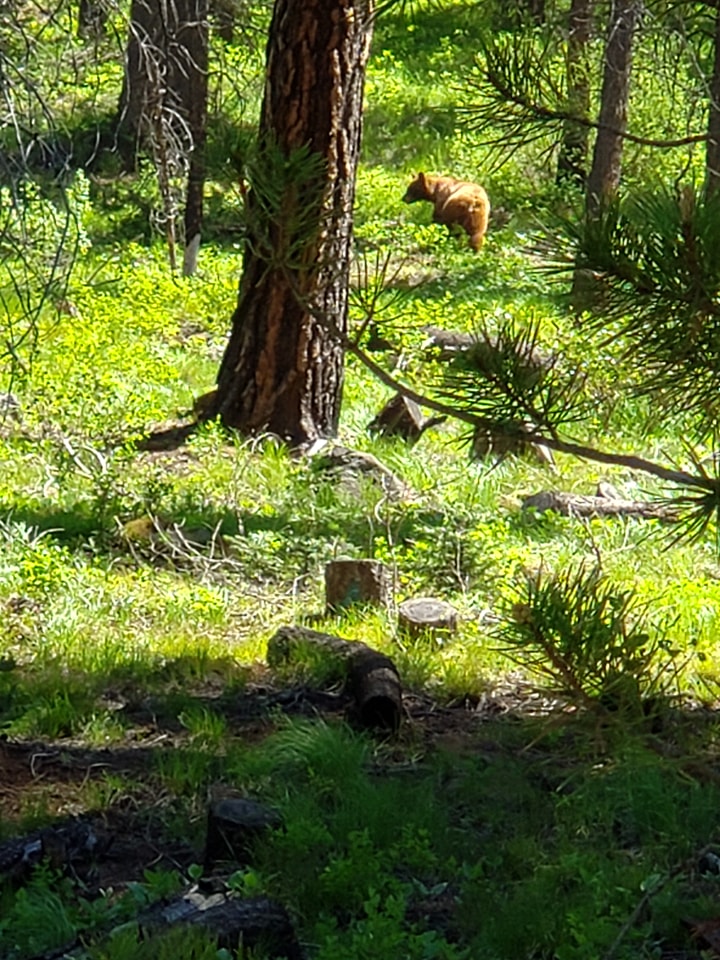Many of us are getting out and enjoying the camping, hiking, fishing, and other outdoor activities. Chances are we will encounter all sorts of wildlife during our adventures. Most of us know we shouldn’t approach wildlife as it can lead to unintended consequences – for humans and the animals. So how can we take in the beautiful sights and sounds of nature while staying safe and respecting wildlife? Read on for some tips!

When it comes to camping, most of us have some favorite meals we look forward to eating and enjoying while sitting around a campfire. We might have some leftover scraps that we chose not to eat. Some people might toss those scraps into the trees and bushes thinking they’ll be providing some hungry squirrel or rabbit with an easy treat. While you might have the best of intentions, you might be causing more harm than good.
Eating food that is not a part of their normal diets can cause wildlife to become quite ill. In addition, if animals become too used to campers, hikers, or other outdoor enthusiasts leaving food behind for them, the animals can start associating humans with food and not fear or avoid us. This not only exposes them to additional dangers but also can endanger humans as well. I don’t know about you but having a bear come over to hunt for scraps because it knows people are around is not my idea of a fun time.

If you have scraps, please throw them away in a trash bag. And don’t leave the trash bag sitting out next to your tent. Hang it up in a far corner of your camp site high enough that wildlife cannot easily get into it. Before heading to bed, be sure to put all your food away – in coolers or other containers – rather than leave it sitting on your camp table. Again, the goal is to keep critters large and small away from your camp area and not come searching for something they think smells good enough to eat. Clean up your cooking utensils including pots, pans, and plates. The goal is to remove the scent of food as much as you possibly can.
In Idaho, it’s not uncommon to see deer, elk, or even bears when you’re out exploring. Case in point is the bear photo seen above. My brother and sister-in-law took this from the dirt road they were traveling on. They didn’t get out of their side-by-side to try and get closer and they didn’t hang around. It may seem like a good idea to try and get just a little bit closer to get a better view but please resist that urge. Not only can it cause undue stress to the animal as they try to escape the perceived danger – which causes them to expend calories they otherwise may need – but it might also instinctually cause the animal to defend itself, their babies, or their territory. When this happens, all bets are off. I certainly don’t want anything charging at me and we’ve all read the accounts of people trying to get too close who end up getting trampled on and injured, or worse, killed.

When you’re exploring, be mindful of sticking to the trails rather than going off into the high grasses or through wildflowers. Not only can this disturb wildlife, but it can also damage the food they may rely on to eat. You should also avoid areas where wildlife may be nesting, wintering, mating, or nursing. Before heading out, research the area you’re heading to so you can avoid causing stress to the animals. If you’re bringing your dog, be sure they don’t run off into the brush either. Keep them on the trail so they are safe and don’t inadvertently stumble on an animal’s den…with the animal in it feeling cornered. I know locally there have been a couple dogs who have been injured by coyotes who likely had pups nearby. If there is a body of water on our pathway, my dogs always want to get in to cool off and have a drink. If your pups are like mine, just keep an eye on them and, again, be mindful of keeping to the trail leading down to the water.

Make noise when you’re hiking or camping and if you can, explore after dawn and before dusk when many animals are most active to avoid startling them. Wildlife is part of the enjoyment of connecting with nature. Being mindful and respectful of them helps us to minimize our impact as we explore the areas in which they live.
Stay safe and have fun out there!
